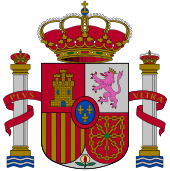
Back Codi penal espanyol Catalan Código Penal (España) Spanish Zigor zuzenbidea Espainian Basque Ispanijos baudžiamasis kodeksas Lithuanian Кримінальний кодекс Іспанії (1995) Ukrainian
This article includes a list of general references, but it lacks sufficient corresponding inline citations. (September 2020) |
| Criminal Code | |
|---|---|
 | |
| Cortes Generales | |
| Enacted by | 5th Cortes Generales |
| Enacted | 8 November 1995 |
| Royal assent | 23 November 1995 |
| Effective | 25 May 1996 |
| Status: In force | |
The Criminal Code is a law that codifies most criminal offences in Spain. The Code is established by an organic law, the Organic Law 10/1995, of 23 November, of the Criminal Code (Ley Orgánica 10/1995, de 23 de noviembre, del Código Penal). Section 149(6) of the Spanish Constitution establishes the sole jurisdiction of the Cortes Generales over criminal law in Spain.
The Criminal Code is structured through two books. The first book regulates general norms about criminal offenses and penalties and the second book regulates crimes and other dangerous situations, to which the code attributes penalties and security measures, respectively. The Criminal Code is a fundamental law of the Spanish criminal law, because it is a limit to the ius puniendi (or «right to punish») of the State.
The Code was enacted by the Spanish Parliament on 8 November 1995[1] and it was published in the Official State Gazette (BOE) on 23 November.[2] The Code is in force since 25 May 1996.[2] Since its publication, it has been modified on more than thirty occasions,[3] the last time on 2 March 2019.
- ^ Cuadra, Bonifacio de la (8 November 1995). "El Congreso aprueba el nuevo Código Penal por 200 votos a favor, con la sola abstención del PP". El País (in Spanish). ISSN 1134-6582. Retrieved 5 June 2020.
- ^ a b "Organic Law 10/1995, of November 23, of the Criminal Code". www.boe.es. Archived from the original on 30 June 2012. Retrieved 5 June 2020.
- ^ León, Carmen Armendáriz (9 June 2015). "Líneas generales de la reforma del Código Penal". Hay Derecho (in European Spanish). Archived from the original on 21 September 2018. Retrieved 5 June 2020.